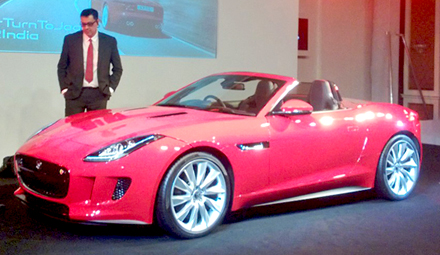 Mumbai, Jul 8: Tata Motors-owned Jaguar Land Rover (JLR) today launched its sports car Jaguar F TYPE priced up to Rs 1.61 crore (ex-showroom Mumbai), while it mulls over assembling more models in India.
Mumbai, Jul 8: Tata Motors-owned Jaguar Land Rover (JLR) today launched its sports car Jaguar F TYPE priced up to Rs 1.61 crore (ex-showroom Mumbai), while it mulls over assembling more models in India.
The Jaguar F TYPE will be available in two variants. The F Type V8S powered by a 5 litre petrol engine will be priced at Rs 1.61 crore (ex-showroom Mumbai), while the F TYPE S with a V6 3-litre petrol engine will be available for Rs 1.37 crore (ex-showroom Mumbai).
"The launch of F TYPE is significant for Jaguar as we are looking at a lot of premeditated spin-off benefits, primarily because of the exclusive nature of the product. It will enhance the appeal of the Jaguar brand in India," Jaguar Land Rover India Vice President Rohit Suri told PTI.
Stating that the sports car market in India is very small, he said JLR is not looking for volumes.
"The primary objective of launching the F TYPE is not for volumes but to showcase technology and take it as a halo product with other products benefiting from it" Suri said.
When asked if JLR is looking to assemble more models in India over and above the Land Rover Freelander 2 and the Jaguar XF sedan, he said: "Yes, we are continuously evaluating opportunities based on how good the volumes are."
Suri, however, did not share which specific models from the JLR stable could be assembled at Tata Motors' Pune facility saying "it will all depend on the business case".
He also ruled out plans for full scale manufacturing of JLR products in India.
On the sales front, he said JLR in the April-June quarter this fiscal grew by 68 per cent driven mainly by the XF sedan, without sharing the absolute numbers.
"Currently we have a huge demand for the XF sedan with a waiting period of about 2-3 months. We are gradually ramping up capacity ot meet the demand," Suri added.





Comments
Add new comment